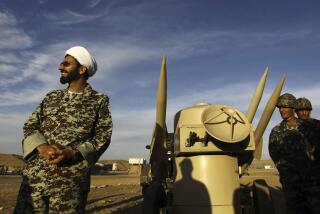Iraq Rejects Future U.N. Arms Limits
- Share via
UNITED NATIONS — Iraq has rejected U.N. controls on Baghdad’s future arms programs, violating the Persian Gulf War cease-fire agreement, the U.N. official in charge of Baghdad’s disarmament said Tuesday.
The government of President Saddam Hussein also canceled talks on possible oil sales to buy vital food and medicine, another U.N. spokesman said.
In a message to the U.N. commission overseeing the destruction of its weapons of mass destruction, Iraq said it will not accept future monitoring of arms-building or purchasing, said Rolf Ekeus, head of the panel.
The U.N. Security Council could take up the matter as early as today, when it is scheduled to review sanctions against the Baghdad government, Ekeus said.
Baghdad has grudgingly complied with U.N. efforts to identify and destroy Iraq’s nuclear, chemical and biological weapons potential under terms of a cease-fire agreement. The destruction of existing weapons is being complied with, said Ekeus.
The third part of the disarmament plan in the cease-fire agreement “has to do with controlling what they produce or acquire anew,” Ekeus said.
But in a mid-January message to the U.N. Special Commission, Iraq declared that once phases one and two were completed, it would consider its obligations fulfilled.
Ekeus, chairman of the commission, called the rejection of the third phase a “violation of the cease-fire agreement,” but he declined to say what he would urge the Security Council to do in response.
The council has authorized the use of force to enforce its resolutions against Iraq.
U.N. spokesman Francois Giuliani said the Iraqi ambassador, Abdul Amir Anbari, told the United Nations his country is canceling the talks on oil sales but gave no reason for canceling them.
U.N. Assistant Secretary General Kofi Annan and aides were already in Vienna waiting for the talks to begin when word of the cancellation came, said spokesman Fred Eckhard.
More to Read
Sign up for Essential California
The most important California stories and recommendations in your inbox every morning.
You may occasionally receive promotional content from the Los Angeles Times.













